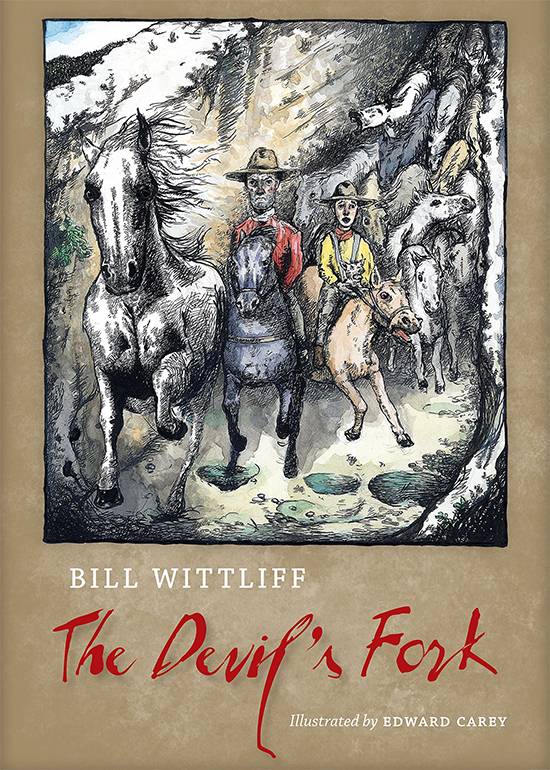The End of a Melody

The Devil’s Fork
by Bill Wittliff
Austin: University of Texas Press, 2018.
172 pp. $29.95 cloth.
Reviewed by
Michelle Piersol
Every story has an end. It is what makes the journey worthwhile. In The Devil’s Fork, the final book of the Papa Stories, esteemed writer Bill Wittliff concludes the adventures of Papa and Calley Pearsall as they crisscross the central Texas landscape for one last time. Beginning with the twist where The Devil’s Sinkhole ended, Papa and Annie must travel to San Antonio to save Calley from the hangman’s noose. En route they meet a man named Pugh tied naked to a tree, participate in a reunification of long-lost brothers, and eventually break Calley out of prison. Their running from the law, joined by the disabled O’Johnny and a mysterious white horse, inspires the ragtag bunch to try horse trading. As horses stolen from abusive masters start appearing within their hideout, this triggers a chain of events that eventually culminates in the bloody climax of the entire series.
As he uses this finale as an exploration of endings, Wittliff becomes philosophical. Increasing the magical realism that was prevalent within the first two novels, Wittliff erases the line between the land of the living and the land of the dead, what exists in the realms of possible and impossible. As the Seven Old Men and the Shimmery People become more prominent occurrences; Papa must face these reminders of mortality, and the reality of existence after death. Reminiscent of Aristotle's Nicomachean Ethics, Wittliff continues the discussion of what makes a virtuous person, and how the characters’ life choices through greed or violence could affect the rest of their living and dying existence. As a Shimmery Man whispers in Papa’s ear, “The only Devil’s Fork they is, he said, is the One right there inside you self.” The Devil’s Fork in that way is less of a physical place, like the Devil’s Backbone or Sinkhole, than it is a state of mind, forcing Papa to decide what path of that fork he will take in this final battle of virtue verses violence.
While criticized earlier in the series as having characters that remained static on either side of the divide between good and evil, Wittliff breaks away within The Devil’s Fork by nuancing the morality of his main protagonists and antagonists. Both Sheriff Pugh and Calley Pearsall are capable of great kindness and violence, while Papa struggles between the two within himself. His attribution with the Homeric title of Sin Nombre has Papa on a journey not only to find balance but also find his true self. While the secondary characters might remain within a static moral alignment and refuse to take on this moral conflict, that does not detract from their importance or make them explicitly one-dimensional.
Wittliff created a world where characters are dead until it is convenient, and deus ex machina is rife within this tall tale to end all tall tales. This can be frustrating for someone searching for a more realistically paced story but adds to the improbability of what is written in the style of an oral folk legend. Someone familiar with southwestern fiction will be able to anticipate the ending, as Wittliff ties up the loose ends of his sprawling narrative in neat and predictable packages. I would hesitate to beat a dead horse over the difficulty of Wittliff’s prose due to his unorthodox capitalization and language, but three novels in it is still jarring and sometimes detracts from especially poignant moments between the characters. Like the previous installments of the series, the pacing within The Devil’s Fork remains irregular, which troubles the natural passage of time within the novel.
Overall, the conclusion of the series is bitter-sweet with The Devil’s Fork offering an escape into the old Southwest if just for a moment. Wittliff’s concluding messages of the importance of found family and one’s responsibility for their actions do not ring hollow, but instead have been some of the defining messages of the series. As Papa muses on his friend Calley, “I come to know Love could pull you a’part or put you back together again either one. Just depended...on if they was other People round who been through the same thing and wadn’t Shy bout showing you You wadn’t never really just all a’lone in the World.” As the journey of the Papa series comes to its natural end, the reader must decide, like The Seven Old Men, how the dominoes will fall for The Devil’s Fork.
Michelle Piersol is a recent graduate of Texas State with a Masters of Literature. A San Marcos native, you can find her wandering the Hill Country (much like Papa) in search of ghost stories and swimming holes.
